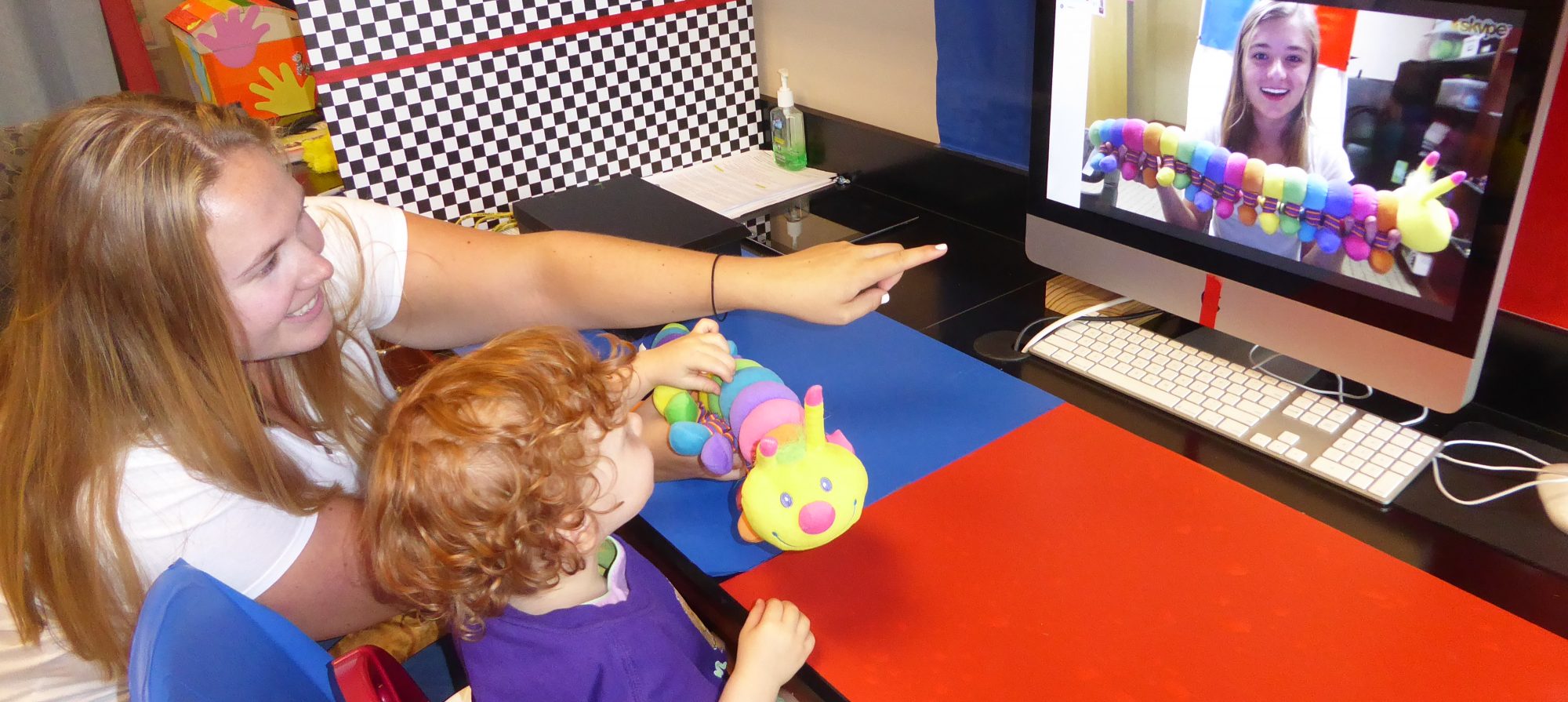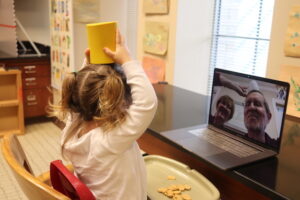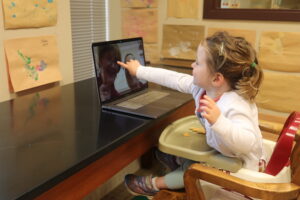Grandparent-Grandchild Zoom Study Information
Title of Project: Using video chat to promote informal social learning interactions between young children and remote on-screen partners
Principal Investigators
Lafayette College University of South Dakota
Lauren J. Myers, Ph.D. Gabrielle Strouse, Ph.D
Psychology Department, Oechsle Hall Delzell Education Center 205B
Easton, Pennsylvania 18042 14 E. Clark Street, Vermillion, SD 57069
Office Phone: (610) 330-5834 Office Phone: (605) 677-5846
E-mail: myersl@lafayette.edu E-mail: gabrielle.strouse@usd.edu
Lab Phone: (610) 330-5870 Lab Phone: (605) 681-6143
Lab: lafayettekidslab@gmail.com Lab email: usdchildrensmediastudy@gmail.com
Web: sites.lafayette.edu/kidslab Web: sites.google.com/usd.edu/gabriellestrouse/home
What is this study about?
Many families are using video chat (e.g., Zoom) to connect with distant friends and family, including grandparents. While video chat seems straight-forward to adults, it can be demanding for children, especially young ones who might get distracted or run away. We want to understand how to best engage children during Zoom interactions so the whole family can avoid frustration and feel engaged and connected.
What are the effects of my participation in this study?
You will help us identify efficient strategies to keep children active during video chat conversations. Our prior research indicates that when families are separated (e.g., due to pandemics, deployment, geographic distance), family video chats may help to build and maintain grandparent-grandchild connections. Your participation will improve the quality of online interactions between grandparents and grandchildren.
How can I participate in this study?
To be in this study you must have a typically developing child between the ages of 18- months and 5-years-old, and a parent and grandparent of the child who are interested in participating. Our definition of “typically developing” is that a medical or psychological professional has not identified your child with any specific psychological diagnosis. Both the parent and participating grandparent should speak English. They must have internet access in the home, as well as a computer, tablet or smartphone for video chat use. The participants will use their device to log into a Zoom link that the researchers will provide at the beginning of the study and to video chat with each other later in the study.
If I choose to participate, what are the logistics of this study on my end as a participant ?
You (parent, grandparent, and child) will participate in eleven online video chat interactions. During the first video chat, you will interact as you usually do. For the next nine video chats, the researchers will give you instructions about things to do with the remote partner, such as read a book, sing songs, or draw together. For the last video chat, you can once again choose how to interact. The researchers will provide a link to use Zoom for these video chat interactions, and Zoom will automatically record the video chat interactions. Researchers will examine how you engage your child in the video chat interactions (e.g., by asking questions), and how your child responds (e.g., by smiling or talking).
The adults (parent and grandparent) will be asked to fill out a survey at the beginning (20 minutes) and end (10 minutes) of the study and a very quick survey (5 minutes) after each of the video chats.
Where is this study done?
You can complete the study in your home. You will first fill out a consent form and short online survey. Then, you will take part in the video chat sessions wherever you choose.
How long will this study take?
It will take about 20 minutes to complete the online parent questionnaire at the start of the study, and about 10 minutes to complete the questionnaire at the end of the study. The length of your eleven recorded video chat sessions with your remote partner will vary in length, depending on how short or long you choose to make them. We estimate that a typical length will be about 5-10 minutes per video chat session (for a total of about 2 hours over the course of several weeks). Therefore, the total time involved for you is about 2.5 hours altogether. We anticipate this to take place over approximately 6-8 weeks (e.g., about 2 sessions/week).
Do I get compensated for participating in this study?
Yes. Your child will receive a Young Scientist certificate with your child’s name and photo on it. You will receive a total of $100 compensation via electronic gift card. Your remote partner will also receive a separate amount of $100 total compensation.
We will break up these payments as follows:
Initial parent questionnaire + video chat sessions #1 and #2: $20
Video chat sessions #3, #4 and #5: $20
Video chat sessions #6, #7, and #8: $20
Video chat sessions # 9, #10 and #11: $20
Final parent questionnaire: $20
You will receive all compensation via e-mail.
Can I stop participating if I want?
Absolutely. Participation in this research is voluntary and you may withdraw at any time. If you want to stop participating, please notify us at lafayettekidslab@gmail.com. If you do not participate in this research or if you later withdraw from this research, you will not be penalized. If you withdraw participation before completing the entire study, you will receive a pro-rated amount of compensation that reflects your participation to that point.
How do I participate in the study?
To participate in the study, parents please complete this questionnaire or grandparents complete this questionnaire. Please schedule a Zoom meeting with the researchers using the Calendly link at the end of the survey after completing the questionnaire.
If you have any questions or concerns regarding this study, please email Lafayette Kids Lab at lafayettekidslab@gmail.com.


